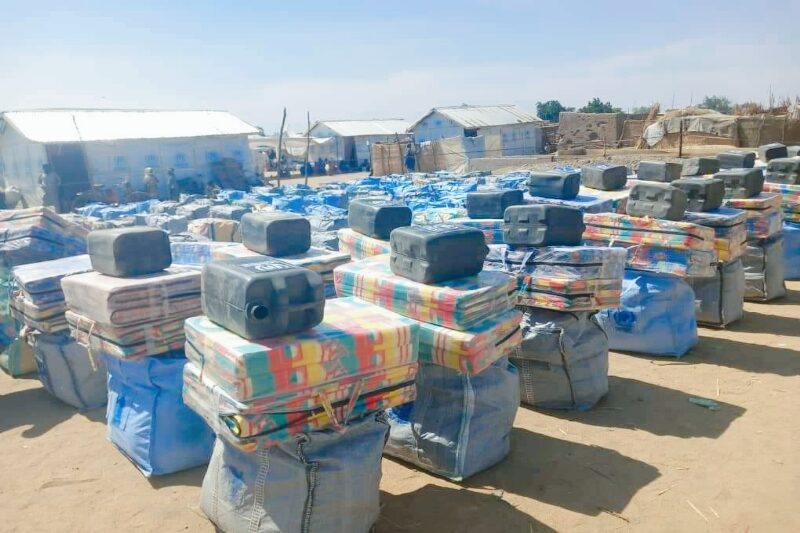The second cohort of more than 200 refugees – who fled to Cameroon and who have been staying at the Minawao camp in that country – have been voluntarily repatriated to their ancestral community in the border town of Banki in the Bama Local Government Area of Borno State.
They returned home on Tuesday, January 24. The first cohort of about 100 households, comprising more than 500 individuals, returned to Banki about 10 days before.
The repatriation was a collaboration between the Nigerian and Cameroonian governments, which, with international non-governmental organisations (iNGOs), provided humanitarian assistance to the returnees.
Alhaji Munyam Banki, a government official of the Bama local council and a member of the Borno State committee on the repatriation of refugees, told RNI that the committee and the Nigerian government’s Federal Office for Migration and Refugees had successfully repatriated the refugees from neighbouring Cameroon to Banki town.
He said all those repatriated had received ₦40,000 each from the federal government.
The Borno State government gave each returnee a bag of rice, cooking oil, a carton of spaghetti, a bag of maize, clothes, as well as ₦40,000 to households and ₦20,000 to all the women.
“Before the repatriation, the Borno State government put in place all the necessary measures to ensure it would continue to provide shelters, ablution facilities, food and other essential items, as well as healthcare services and other social services.
“And the Nigerian government had made sure there were adequate security measures to safeguard the repatriated refugees. The army, customs, immigration, police and other security operatives are working tirelessly in Banki to ensure the protection of lives and property. The government had received clearance from security operatives before the repatriation began,” Munyam Banki said.
The first cohort of refugees were received by Sadiya Umar Faruq, Nigeria’s Minister of Humanitarian Affairs Disaster Management and Social Development and a federal commissioner for refugees, Grema Terab, the transition committee chairman of the Bama local council, members of iNGOs, members of the Borno State committee on the repatriation of refugees, led by Lawan Abba Wakilbe (Borno State’s commissioner of education), and other top government officials.
Munyam Banki said the Cameroonian government consolidated the Nigerian government’s efforts by providing humanitarian aid, such as food and other essential items, to the repatriated refugees.
“I urge the repatriated refugees to be law-abiding, patient and resilient. They have been taking refuge at Minawao camp in neighbouring Cameroon for six to eight years to avoid being attacked during the insurgency in Nigeria.
But now they have been successfully returned to their hometown, where they can continue their businesses and farming activities without any of the threats or fear that had made them flee the town in the first place.
“Some of the repatriated refugees were inhabitants of Tarmuwa village, which is about 3km to 4km away from Banki, the headquarters of the Bama local council, and are known for their agricultural activities, especially irrigation farming.
That’s why the Borno State government cleared their farmlands and dug about 25 boreholes in the village before the refugees were repatriated. The government wanted them to be able to continue their irrigation farming activities as soon as they returned home,” he said.
Grema Kyari, the candidate of the People’s Democratic Party to represent Bama Central in the Borno State House of Assembly, told RNI that it was the right time for the government to repatriate Nigerians who were living in neighbouring countries as a result of the insurgency because these people were tired of taking refuge at camps and depending on humanitarian aid from NGOs.
“Refugees want to return to their hometowns, so that they can live in dignity in their houses, as well as continue their businesses and farming activities as they did before the insurgency.”
He claimed as many as 1,300 refugees had returned to Banki from neighbouring Cameroon, even though they were being well taken care of in camps in that country.
“We heard the Cameroonian government really tried its best to take care of the Nigerian refugees,” he said.
Kyari said repatriating refugees was not enough and the government should note that not only had they voluntarily returned, but they were also expecting to have better living conditions and not to be resettled or live inside a camp again.
“It is the responsibility of the government to rebuild their houses, market place, hospitals, schools and to provide social services, such as effective healthcare service delivery, clean potable water and education. They want to live in peace, so the government must ensure stable security.
“It is inappropriate for the government to repatriate refugees without taking active measures that will pave the way for their sustainable livelihoods. Government officials must be honest and open about whatever they are doing to fulfil all the promises it made with regards to changing the lifestyles of repatriated refugees, so that they can continue to live in better living conditions without thinking of returning to neighbouring countries.”
SHETTIMA LAWAN MONGUNO









